人教版(2019)必修 第二册 Unit 4 History and Traditions Discovering Useful Structures课件(共14张PPT)
文档属性
| 名称 | 人教版(2019)必修 第二册 Unit 4 History and Traditions Discovering Useful Structures课件(共14张PPT) |

|
|
| 格式 | pptx | ||
| 文件大小 | 18.7MB | ||
| 资源类型 | 教案 | ||
| 版本资源 | 人教版(2019) | ||
| 科目 | 英语 | ||
| 更新时间 | 2024-09-28 00:00:00 | ||
图片预览

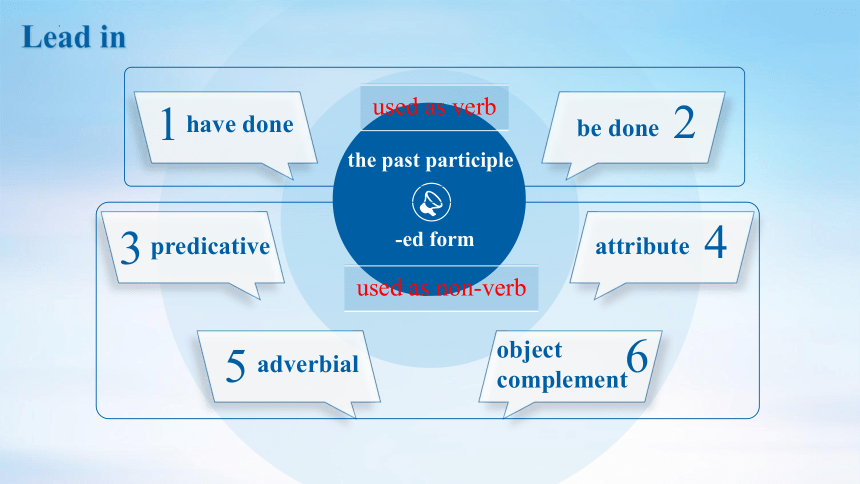
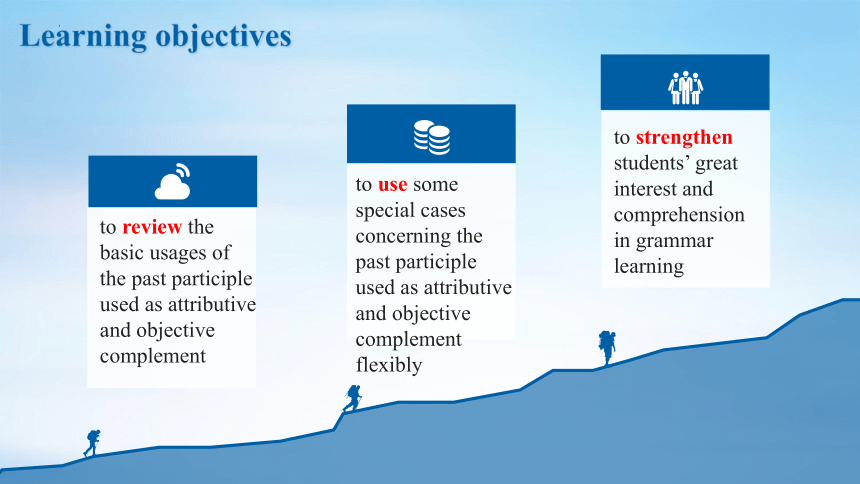
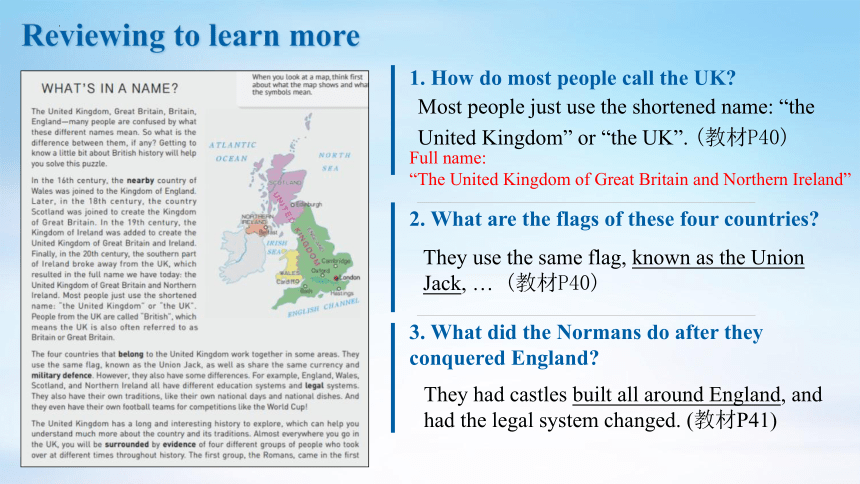
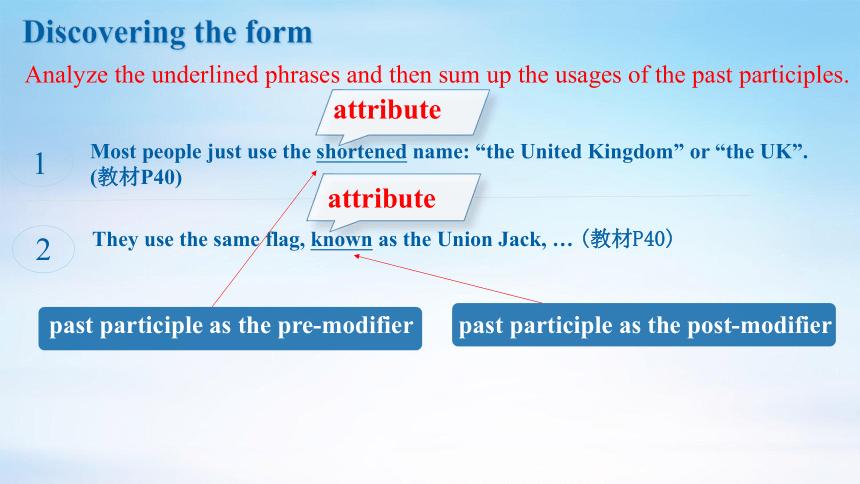
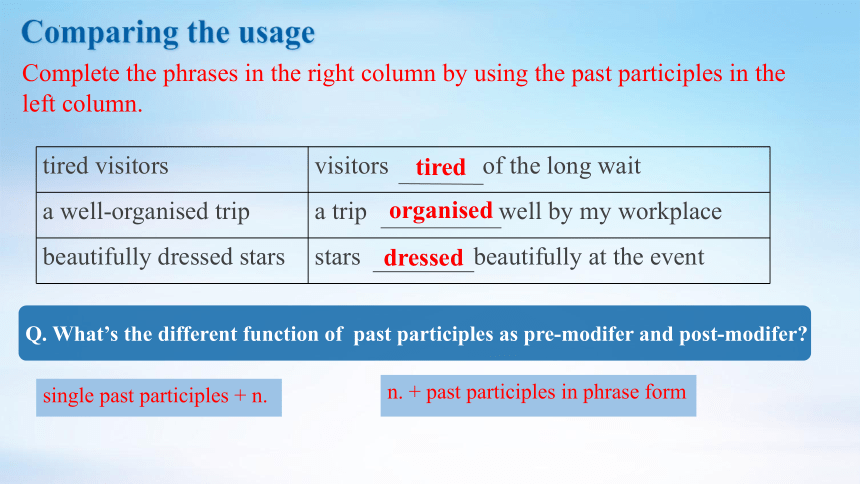

文档简介
(共14张PPT)
Unit4 Discovering Useful Structures
Expressing feelings and describe situations
the past participle
1
have done
3
predicative
5
adverbial
6
object
complement
4
attribute
2
be done
-ed form
Lead in
used as verb
used as non-verb
to review the basic usages of the past participle used as attributive and objective complement
to strengthen students’ great interest and comprehension in grammar learning
to use some special cases concerning the past participle used as attributive and objective complement flexibly
Learning objectives
1. How do most people call the UK
2. What are the flags of these four countries
3. What did the Normans do after they conquered England
Reviewing to learn more
Most people just use the shortened name: “the
United Kingdom” or “the UK”. (教材P40)
They use the same flag, known as the Union Jack, … (教材P40)
They had castles built all around England, and had the legal system changed. (教材P41)
Full name:
“The United Kingdom of Great Britain and Northern Ireland”
1
Most people just use the shortened name: “the United Kingdom” or “the UK”. (教材P40)
2
They use the same flag, known as the Union Jack, … (教材P40)
Discovering the form
Analyze the underlined phrases and then sum up the usages of the past participles.
attribute
attribute
past participle as the pre-modifier
past participle as the post-modifier
Comparing the usage
tired visitors visitors of the long wait
a well-organised trip a trip well by my workplace
beautifully dressed stars stars beautifully at the event
tired
dressed
Complete the phrases in the right column by using the past participles in the
left column.
organised
Q. What’s the different function of past participles as pre-modifer and post-modifer
single past participles + n.
n. + past participles in phrase form
Discovering the form
Analyze the underlined phrases and then sum up the usages of the past participles.
3
They had castles built all around England, and had the legal system changed.
(教材P41)
object complement
object complement
have sb./sth. done
object
object complement
past participle as thethe object complement
8%
Comparing and practising
Read each sentence and underline the -ed form as the object complement.
1. Judy and I had our car parked in an underground car park near Trafalgar Square, where we could get our car battery charged.
2. When we finally reached the service desk to ask for audio guides, we heard it announced that there were no audio guides left.
3. We found ourselves very surprised by the large number of visitors and the amount of noise at the entrance of the National Gallery.
4. Judy had her eyes fixed on Van Gogh’s Sunflowers. It was hard to approach the painting as there were so many people around.
5. She had a copy of the painting boxed to ensure that it was delivered safely.
have/get sb./sth. done
hear/see/watch/notice sb./sth. done
find sb./sth. done
have/get/make/keep/leave sb./sth. done
Summarizing the usage
When we use past participle as the object complement, they are usually appear in the following structures:
have/get/make/keep/leave sb./sth. done
hear/see/watch/notice sb./sth. done
find sb./sth. done
Practising 1
Rewrite the sentences with past participles as the attribute.
1.Loch Ness was surrounded by beautiful natural landscape, which made it look amazing.
2.Carl and his friends stayed with a generous family who offered them bread with butter and honey that was homemade.
3.The family’s ancestor once attended to soldiers who were wounded in the First World War.
4.The young people were attracted by the legend of Loch Ness. They watched over the lake with their cameras and binoculars were positioned on the hill.
Practising 1
Answers
1.Loch Ness surrounded by beautiful natural landscape looks amazing.
2.Carl and his friends stayed with a generous family who offered them homemade bread with butter and honey.
3.The family’s ancestors once attended to wounded soldiers in the First World War.
4.The young people attracted by the legend of Loch Ness watched over the lake with their cameras and binoculars positioned on the hill.
Then see whether you can write a little story with them.
Practising 2
Complete the sentences with the past participles of the verbs as the attribute or the object complement.
1.The manager was satisfied to see many new products _________ (develop) after great effort.
2.The cars _________ (sell) at the market now are made in Shanghai.
3. The police will come soon to take away the _________ (damage) car.
4.Back from his two year medical service in Africa,Dr.Lee was very happy to see his mother ______ (take) good care of at home.
5. George telephoned a man ________ (call) himself Peter.
6.The new books ____________(print) in the factory at the moment are mainly intended for children.
7.The young man, ______ (tire) of working for others,is determined to start his own firm.
developed
being sold
damaged
taken
tired
calling
being printed
Assignment
Complete the conversations with the past participles of the verbs as the attribute or the object complement. (P81 / Ex.4)
Give some examples to illustrate the usage of past participles
01
02
THANK YOU FOR WATCHING
Unit4 Discovering Useful Structures
Expressing feelings and describe situations
the past participle
1
have done
3
predicative
5
adverbial
6
object
complement
4
attribute
2
be done
-ed form
Lead in
used as verb
used as non-verb
to review the basic usages of the past participle used as attributive and objective complement
to strengthen students’ great interest and comprehension in grammar learning
to use some special cases concerning the past participle used as attributive and objective complement flexibly
Learning objectives
1. How do most people call the UK
2. What are the flags of these four countries
3. What did the Normans do after they conquered England
Reviewing to learn more
Most people just use the shortened name: “the
United Kingdom” or “the UK”. (教材P40)
They use the same flag, known as the Union Jack, … (教材P40)
They had castles built all around England, and had the legal system changed. (教材P41)
Full name:
“The United Kingdom of Great Britain and Northern Ireland”
1
Most people just use the shortened name: “the United Kingdom” or “the UK”. (教材P40)
2
They use the same flag, known as the Union Jack, … (教材P40)
Discovering the form
Analyze the underlined phrases and then sum up the usages of the past participles.
attribute
attribute
past participle as the pre-modifier
past participle as the post-modifier
Comparing the usage
tired visitors visitors of the long wait
a well-organised trip a trip well by my workplace
beautifully dressed stars stars beautifully at the event
tired
dressed
Complete the phrases in the right column by using the past participles in the
left column.
organised
Q. What’s the different function of past participles as pre-modifer and post-modifer
single past participles + n.
n. + past participles in phrase form
Discovering the form
Analyze the underlined phrases and then sum up the usages of the past participles.
3
They had castles built all around England, and had the legal system changed.
(教材P41)
object complement
object complement
have sb./sth. done
object
object complement
past participle as thethe object complement
8%
Comparing and practising
Read each sentence and underline the -ed form as the object complement.
1. Judy and I had our car parked in an underground car park near Trafalgar Square, where we could get our car battery charged.
2. When we finally reached the service desk to ask for audio guides, we heard it announced that there were no audio guides left.
3. We found ourselves very surprised by the large number of visitors and the amount of noise at the entrance of the National Gallery.
4. Judy had her eyes fixed on Van Gogh’s Sunflowers. It was hard to approach the painting as there were so many people around.
5. She had a copy of the painting boxed to ensure that it was delivered safely.
have/get sb./sth. done
hear/see/watch/notice sb./sth. done
find sb./sth. done
have/get/make/keep/leave sb./sth. done
Summarizing the usage
When we use past participle as the object complement, they are usually appear in the following structures:
have/get/make/keep/leave sb./sth. done
hear/see/watch/notice sb./sth. done
find sb./sth. done
Practising 1
Rewrite the sentences with past participles as the attribute.
1.Loch Ness was surrounded by beautiful natural landscape, which made it look amazing.
2.Carl and his friends stayed with a generous family who offered them bread with butter and honey that was homemade.
3.The family’s ancestor once attended to soldiers who were wounded in the First World War.
4.The young people were attracted by the legend of Loch Ness. They watched over the lake with their cameras and binoculars were positioned on the hill.
Practising 1
Answers
1.Loch Ness surrounded by beautiful natural landscape looks amazing.
2.Carl and his friends stayed with a generous family who offered them homemade bread with butter and honey.
3.The family’s ancestors once attended to wounded soldiers in the First World War.
4.The young people attracted by the legend of Loch Ness watched over the lake with their cameras and binoculars positioned on the hill.
Then see whether you can write a little story with them.
Practising 2
Complete the sentences with the past participles of the verbs as the attribute or the object complement.
1.The manager was satisfied to see many new products _________ (develop) after great effort.
2.The cars _________ (sell) at the market now are made in Shanghai.
3. The police will come soon to take away the _________ (damage) car.
4.Back from his two year medical service in Africa,Dr.Lee was very happy to see his mother ______ (take) good care of at home.
5. George telephoned a man ________ (call) himself Peter.
6.The new books ____________(print) in the factory at the moment are mainly intended for children.
7.The young man, ______ (tire) of working for others,is determined to start his own firm.
developed
being sold
damaged
taken
tired
calling
being printed
Assignment
Complete the conversations with the past participles of the verbs as the attribute or the object complement. (P81 / Ex.4)
Give some examples to illustrate the usage of past participles
01
02
THANK YOU FOR WATCHING
